Pond Life
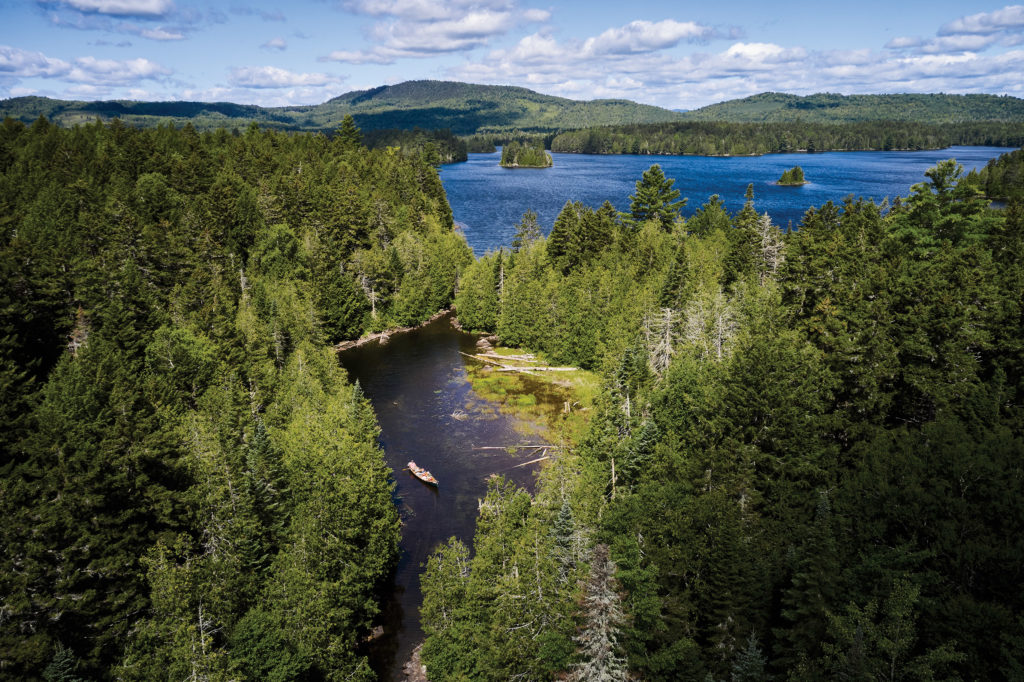
Pond Life
On a hand-drawn map, Pierce Pond looks like a long, spider-legged splatter in the middle of the forest. But the tucked-away Somerset County watershed that’s home to Cobb’s Pierce Pond Camps is legendary—for its uncut shorelines, abundant loons, oversized brook trout, and landlocked salmon.
by Sandy Lang
Photography by Peter Frank Edwards
Issue: November 2020
Filling a scraggly valley northeast of Flagstaff Lake is a western Maine body of water I’d never heard of. But when I mention Pierce Pond to a few freshwater anglers, they’re familiar. Since the early 1900s, the forestand mountain-edged pond has been home to one of those treasured “you’ve got to know to know” sporting camps. And every spring-to-fall since 1958, successive generations of the Cobb family of New Portland have opened Cobb’s Pierce Pond Camps along the lower basin of Pierce Pond. (Camp operator Andy Cobb’s sister, Jennifer, booked our reservation; Cobb cousins work in the kitchen and dining room; and Gary and Betty Cobb—Andy and Jennifer’s parents—are retired now but still visit.)
This outpost enclave of cabins is our destination, a remote outlier that Andy Cobb and his crew have opened for as much of the 2020 season as possible, given the pandemic. On an early-August morning, the world’s worries grow faint as we drive deeper into the undeveloped woodlands—about three hours due north of the saltwater harbor in Portland. The focus here is freshwater, and figuring out the location and travel particulars is part of the adventure.
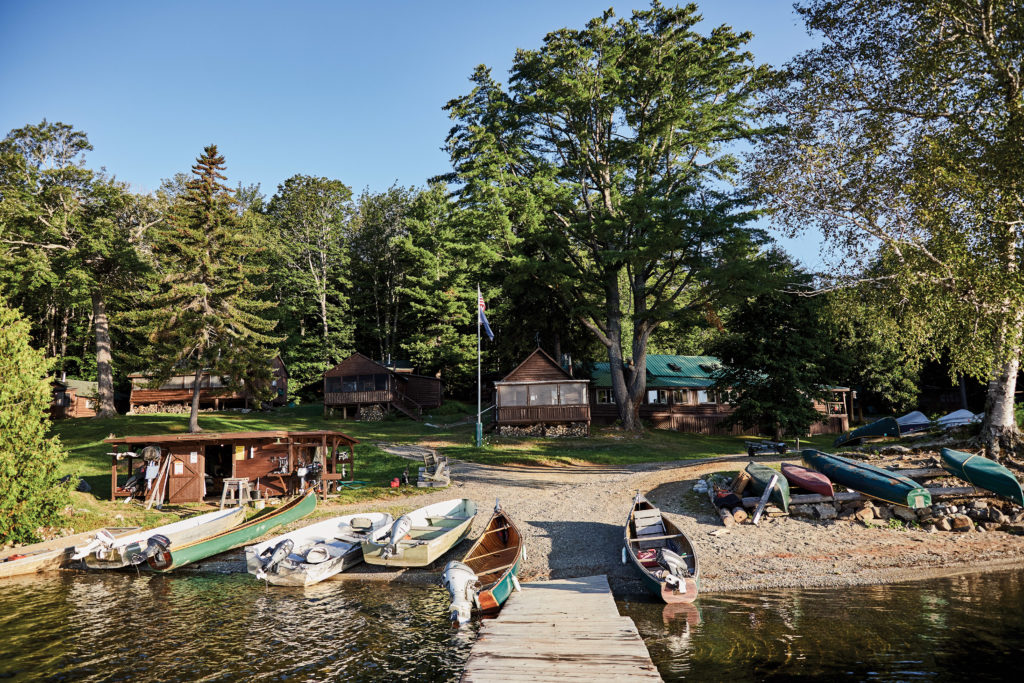
I got a heads-up from the sporting camp that there would be no cellular service at the camps, nor in the final 27 miles beyond the town of New Portland (population 689), so I’ve brought along a printout of the map and directions. It’s a fairly straightforward route up Route 16, then onto Long Falls Dam Road, at one point passing the trailhead for the Flagstaff Hut of Maine Huts and Trails. By the last few turns, photographer Peter Frank Edwards and I are following logging-style dirt and gravel roads, while wooden “Cobb’s” signs nailed to tree trunks point the way.

Gate, Ferry, Cabin
Suddenly a gate spans the road, and a woman emerges from a small building, eyeing our car and our faces while she waits for us to speak. “We’re headed to Cobb’s,” I say, and it’s like the golden password. She asks our names and says she’ll call ahead and let them know to send a boat over to pick us up.
Past the gate and a little farther down a hill, we ease into a parking area that’s lined with pickup trucks and SUVs. Pond visitors may hike or take a boat from here—or zip across the frozen water on a snowmobile in winter— but there is no road to the camps. We unload our bags and lock the car here at Lindsay Cove, one of the pond’s southernmost points.
Smiling, bearded Fred Burnham, water operator for the camps, has already motored up to the dock, and soon we’re on a less-than-five-minute ride to Cobb’s, where cabins are perched in a clearing in the trees on the western shoreline. Floating docks are lined with canoes and small motorboats. When Burnham cuts the ferry engine, there’s little sound left besides the water lapping against the tethered boats.
A toddler wearing a flotation vest is splashing in the shallow water while his parents encourage him to swim. On the next dock over, a woman in a wooden chair is reading a book in the afternoon sunlight. And as we unload our gear, I notice one of the guides carrying two fish that he’s just cleaned at a wooden table at the water’s edge. It’s the catch of two “sports” he took out today to a few of the fishing spots on the pond, guide Steve Thurston explains. The guests caught one each of the lake’s famed brook trout and landlocked salmon (the kind that don’t migrate to the sea), and I’m struck by their healthy size: each looks to be a two- or three-pounder.
The log cabin where we’ll stay is situated on a small hill near the main lodge, and has a screened front porch and large windows toward the pond. I test the view while sitting atop the bed, which is made up with smooth white sheets and plaid woven blankets. With pillows propped behind me I can easily see the expanse of shimmering water outside. It’s woodsy-cozy in this cabin (number three), with a table for two, oil lanterns and matches, a woodstove with a stack of firewood at the ready, and a roomy full bathroom. No electric power lines lead to Cobb’s, and there’s no Wi-Fi or cell phone reception, but the cabin has hot water and electricity from the camp’s propane-fueled generator, which we’re told is kept running from early morning until 10 p.m.

Pulling a block of ice from under a blanket of sawdust in summertime; the ice was hand-cut from Pierce Pond in January, then broken into shards and put to use throughout the year. 
Here, it’s used in predinner pours of single-malt whiskey on the cabin porch.
Summer Ice
In a few minutes, Burnham stops by to bring a bucket of chipped pond ice. The shards and chunks are crystalclear, without bubbles or cloudiness. Every January, he explains, third-generation owner Andy Cobb is joined by other family and a group of staff and friends. They cut ice from the pond in large blocks that are then kept a few hundred yards away, buried in sawdust in a small, barnlike icehouse. It’s amazing to fathom how the freezing temperature holds through the summer months. I put a piece of the natural ice in my cup. The crystal-clear shards have the pure, clean taste of deep, cold water and a slight sweetness—like something you’d want to plunk into a glass of whiskey.
But first, dinner. Meals here are provided as part of the lodging rate, and at dinnertime staff clang the red-painted bell on the kitchen porch. We have seen only a few other guests since arriving, but at the bell’s ringing, screen doors open from the surrounding cabins, and about a dozen fellow guests begin walking past the picnic areas, tree swings, canoe storage, and horseshoe pit toward the central lodge. Inside the main lodge building at Cobb’s, log walls are open to the rafters in a dining room decorated with local maps, books on nature and history, vintage outboard motors on stands, and mounted taxidermy of prized fish, deer, and a mellow-looking moose head.
We’re guided to a table that we’re told will be ours for each dinner and breakfast, already set with plates, glasses, and all the meal’s sauces and dressings. (The lunches are picnic-style, packed to order each morning for guests to carry on outings.) Servers bring selections from the lineup of hearty, house-made recipes, including just-baked bread and butter, wedge salads with blue cheese, grilled steaks cooked to order, and bowls of French onion soup topped with gooey melted cheese. If you’ve caught a fish, they’ll cook that for you—two sisters are ordering up theirs for breakfast in the morning. Meanwhile, desserts include ice cream sundaes and squares of old-fashioned dinette cake topped with strawberries and whipped cream. I hear several people ask for extras of the peanut butter cookies, and make a mental note to request a couple of those tomorrow.

Guides help guests find the pond’s legendary trout and salmon. 
Andy Cobb is a third-generation operator of the camps. 
The dining room where guests gather for meals, in the log-built lodge at Cobb’s Pierce Pond Camps. 
The camp will cook up guests’ catches for dinner or breakfast, by request.
Three in One
Because of its elongated, rocky shoreline, you can’t look across the water and see this pond from end to end. It comprises some 1,600 acres of coves, drop-offs, rock cliffs and ledges, stream endings, and islands. I stand on the dock in the morning sun with a map and think how the shape of Pierce Pond reminds me of a mini version of western Maine’s much, much larger Moosehead Lake, some 30 miles to the northeast.
To see more of its natural features, we hire one of the camp guides for a half day to show us around by boat. Like everyone we’ve met working at Cobb’s, Bob McLaughlin greets us dockside with genuine warmth and a goodnatured sense of calm. Perhaps the pine- and spruce scented air is a balm to everyone’s spirits. McLaughlin points ashore to his black Labrador retriever, named Otter, whom we’ve seen ambling around all morning, gaining pats on the head wherever he goes. McLaughlin leads us to a Grand Laker–style canoe that he built himself. At nearly 20 feet long and outfitted with an outboard motor, it looks iconically Maine. The sturdy, square-stern boats are known for affording a smooth ride across open water, even in a windy chop.
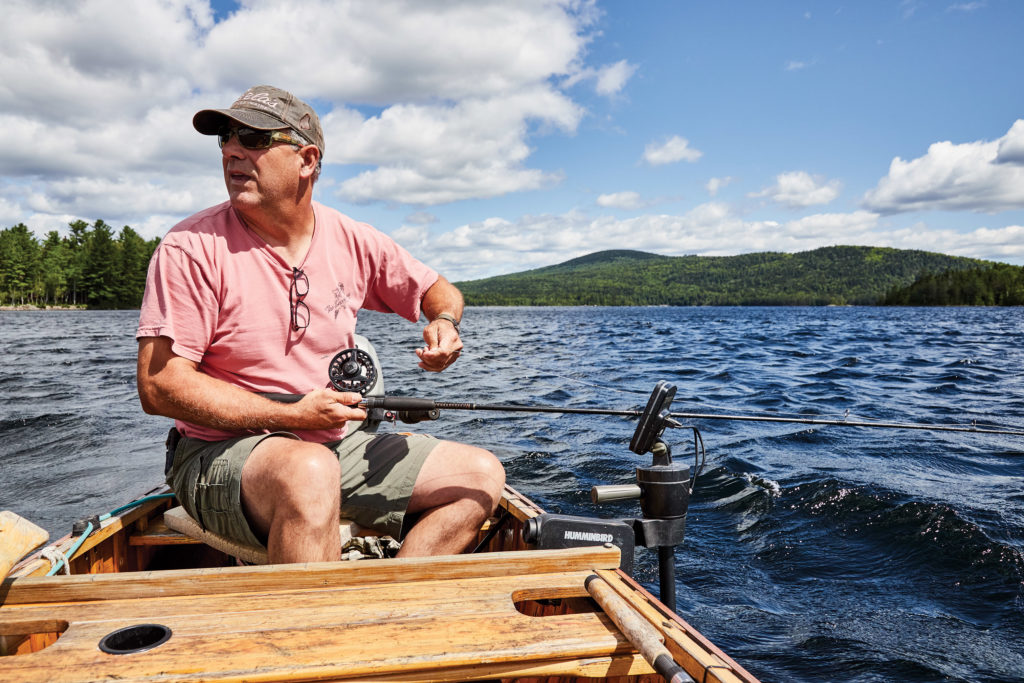
Wind isn’t an issue on this sunny morning with McLaughlin as we motor off in the sunshine for a tour of the Lower Pond, Middle Pond, and Upper Pond, where the waterscape changes from “bony” sections with rocks breaking the clear water’s surface to areas of deep pools and channels. Pierce Pond is like three ponds in one. “I’ve been out here more than 40 days in a row now, and I never get sick of it,” McLaughlin says.
He shows us an island where he’s camped—and where he and his wife like to swim from a small sandy beach— and trailheads that lead to smaller fishing ponds or dayhikes up nearby mountains. He points out moose hide – outs, flocks of merganser ducks, and several loon pairs— often swimming with one or two babies in tow. These are loony waters. McLaughlin notes that the pond is host to one of the highest concentrations of common loons in the state, and some years guests have reported seeing up to 12 pairs of loons nesting on the pond. In three hours, we see plenty of woods, water, and wildlife—including a stream of loon sightings—but only two other distant boats.
In the afternoon, back at the camps, I find Andy Cobb on the front porch of the lodge, and we talk a while. His grandparents took over the place more than 60 years ago, and his father, Gary, literally co-authored the history of Pierce Pond. Andy and Jennifer grew up at the camps. The first couple years of his life, Andy’s family lived at the remote camp year-round, and he was guiding fishing trips by his teen years in the 1980s.
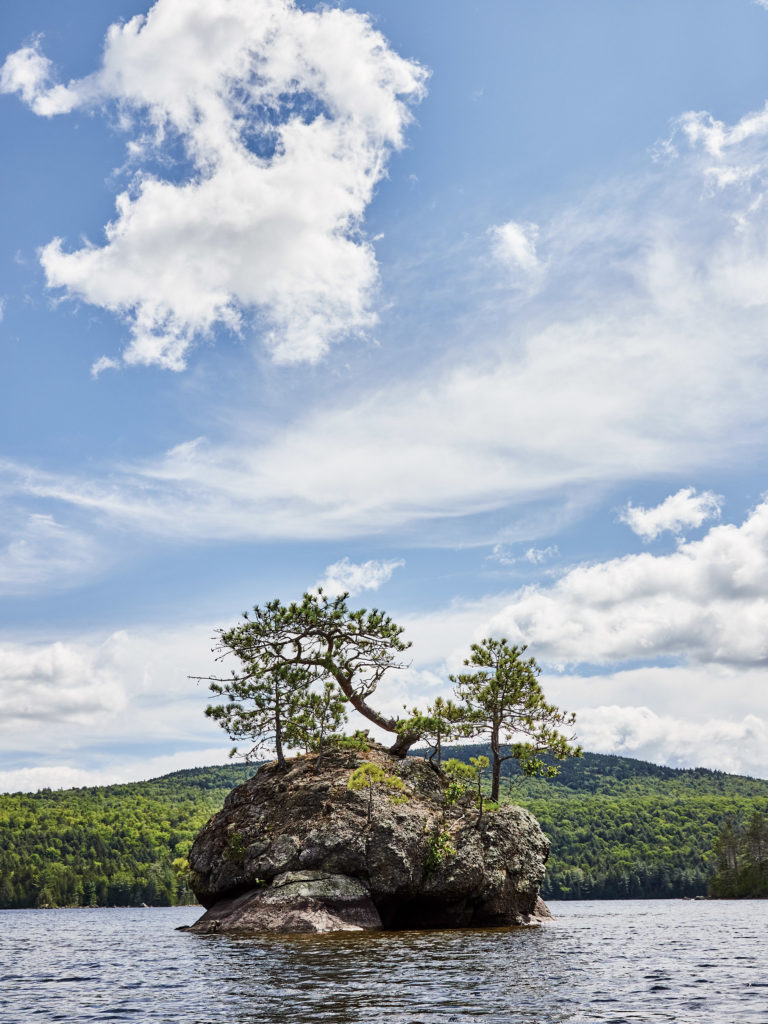
The History of Pierce Pond is an out-of-print volume published in 1992 that was researched and written by Gary Cobb and Alfred Fenton and describes how sometime in the late-1800s the pond was stocked by hand-carried salmon fry, likely hatched in smaller Otter Pond nearby. (Andy keeps one of the rare copies in the camps’ office.) Eventually, the book’s authors contend, “Pierce Pond changed from one in which eels and pick – erel dominated, to a home for large, succulent, if reluctant, trout and landlocked salmon.” I read fishing tales in the borrowed book into the night.
I wake when an outboard motor glug-glugs to a start. It’s just before dawn, and I pull a blanket up higher in the cool of another August morning. The sun will be rising soon, sending salmon-pink light across the line of cabins and the sprawling water of Pierce Pond. I can already hear a songbird singing somewhere in the woods to start the day. Loons are surely near, and maybe Otter, and I smell coffee brewing from the lodge kitchen, but I cling to a few more minutes of fine sleeping.
It’s just everyday pond life in summer, I suppose, but such a gentle, open-window morning in western Maine feels like just what we’ve all been needing.

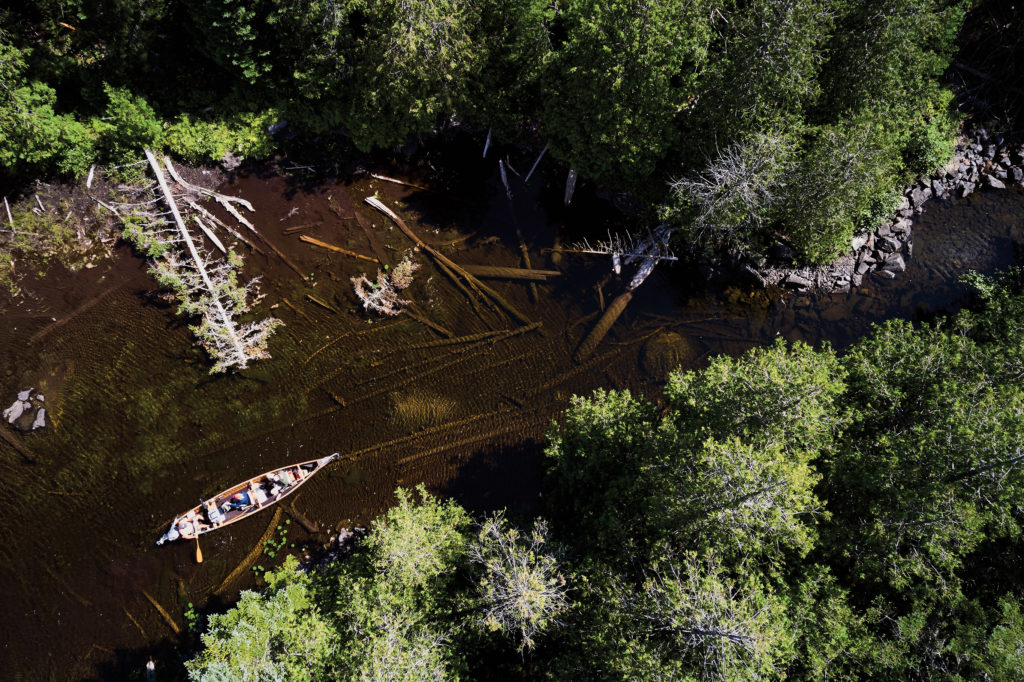
Trust for the Pond
The Cobb family, nearby landowners, and others devoted to the pristine water quality and forested wildness around Pierce Pond joined together in 1989 to form the Maine Wilderness Watershed Trust. Their aim is to raise funds and awareness of the need to protect the water quality and ecosystem of the ten ponds within this watershed, situ – ated northwest of Flagstaff Lake. “The goal is for my kids and their kids’ kids to see the same thing we’re seeing today,” says guide Bob McLaughlin while scanning the nearly unbroken treeline along the shores of Pierce Pond. piercepondwatershed.org
Know Before You Go
A traditional sporting camp, Cobb’s Pierce Pond Camps traces its start to a shoreline cabin built in 1904 and is one of only a hand – ful of cabins and campsites on the pond. The Cobb family has operated the camps since the 1950s and welcomes anglers and nonfishing guests from May through September, including many couples and families, kayakers, lake swimmers, and wildlife watchers. Besides the cabins (with meals included), waterfront campsites on islands in the pond may also be booked, along with guides and boat rentals. cobbspiercepondcamps.com

